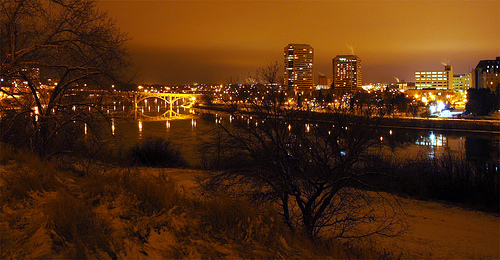By Karen Aney (The Cascade) – Email
Print Edition: March 21, 2012
Hockey is a winter sport. You play it on ice. Ice doesn’t fare well in the summer. So, yeah, it’s a winter sport. However, this hasn’t stopped the NHL from placing teams in the sun-belt – the Florida Panthers, Tampa Bay Lightning, et al. Last year, we saw the end of the Atlanta Thrashers, who became the Winnipeg Jets. This year, we’re seeing another sun-belt team, the Phoenix Coyotes, head down the same path as the Thrashers. But where will they end up?
Rumours suggest many places; perhaps chief among them are Saskatoon and Seattle. Rather than taking what someone said on Twitter as gospel, let’s take a logical look at whether or not those cities can feasibly host an NHL team.
Each year, Forbes outlines and reports the worth, income, and operating budget of each team in the NHL. The teams are then ranked according to value. This year, the original six teams (Toronto, New York, Montreal, Detroit, Boston and Chicago) are ranked as numbers one through six. Barring unforeseen circumstances (for instance, if the Detroit Red Wings contract some mad octopus disease that then wipes out the entire city), this isn’t going to change. Keeping that in mind, let’s look at the next three teams and see what they have in common: those teams are the Vancouver Canucks, the Philadelphia Flyers, and the Pittsburgh Penguins. How do these teams sell tickets and stay successful?
One common trait? They’re populous cities. The Greater Vancouver Area is home to 2,313,328 people (according to the 2011 census). Metropolitan Philadelphia has 4,008,994 residents (according to the 2010 census). Metropolitan Pittsburgh houses 2,356,285 people (according to the same census). Seats available in the arenas are 18,890 in Vancouver, 19,537 in Philadelphia, and 18,387 in Pittsburgh. This means that each team has a fairly low person-to-seat percentage: 0.81 in Vancouver, 0.78 in Pittsburgh, and 0.48 in Philadelphia. This means that organizations can charge a premium price, because they have a large audience to target for sales.
The bottom three teams in the league are the Phoenix Coyotes, the New York Islanders and the Columbus Blue Jackets. The Islanders are somewhat of an anomaly: though there is a large population in their area, there are also two other NHL teams within driving distance to contend with. This includes an original six team. Translation? They don’t have much of a chance to sell out tickets. Phoenix, on the other hand, has a low population—1,445,732 citizens at the last census—and a relatively small arena—17,534 seats—which equates to 1.2 per cent of the population. That is a pretty large number, considering the general apathy surrounding hockey in the city. Columbus’s statistics look slightly better – 18,144 seats is 0.98 per cent of the 1,836,536 population.
So, with those numbers in mind, let’s take a look at Saskatoon. Their metropolitan population, according to the 2011 census, was 260,600 people. No, that number isn’t missing a digit. Applying Vancouver’s successful seat-to-population percentage, they can expect to sell 2,110 tickets per game. So, sorry Don Cherry; the Jets are doing alright so far, but things don’t look good for Saskatoon. Simply put, installing an NHL team in a city with such a small population is not a money-making venture. Seattle, on the other hand, has 3,439,809 citizens according to the 2010 census. Though they already have two national sports league teams, it’s not unreasonable to think that they could theoretically sustain a third, especially given the fact that everybody outside the province hates the Canucks with a burning passion. Given their population, demonstrated market for sports, and lack of proximity to any other NHL team that they’re willing to cheer for, Seattle looks to be a prime candidate for an NHL team. Saskatoon? Not so much.


